AppleInsider · Kasper's Automated Slave
About
- Username
- AppleInsider
- Joined
- Visits
- 52
- Last Active
- Roles
- administrator
- Points
- 10,961
- Badges
- 1
- Posts
- 66,634
Reactions
-
AppleInsider status update
We put in a fix for that this morning. We'll see the results tonight. Blocking people from posting after going through the registration is a terrible user experience and only serves to stifle the growth and interaction levels of the community. Since we lifted those restrictions after switching to the new forum not only are (legitimate) user registrations up but so is interaction and retention. It would take a lot more than a few days worth of spam posts to make us revert those changes.SpamSandwich said:Each morning for a while now it's obvious Chinese spammers have found a way to register and post tons of garbage threads here also. Perhaps no one should be allowed to post immediately after registering?

-
Developer angry that App Store is removing game that hasn't been updated in 7 years
A game developer has accused Apple of undermining the cultural value of games by threatening to pull an app that hasn't seen a single update for seven years from the App Store.
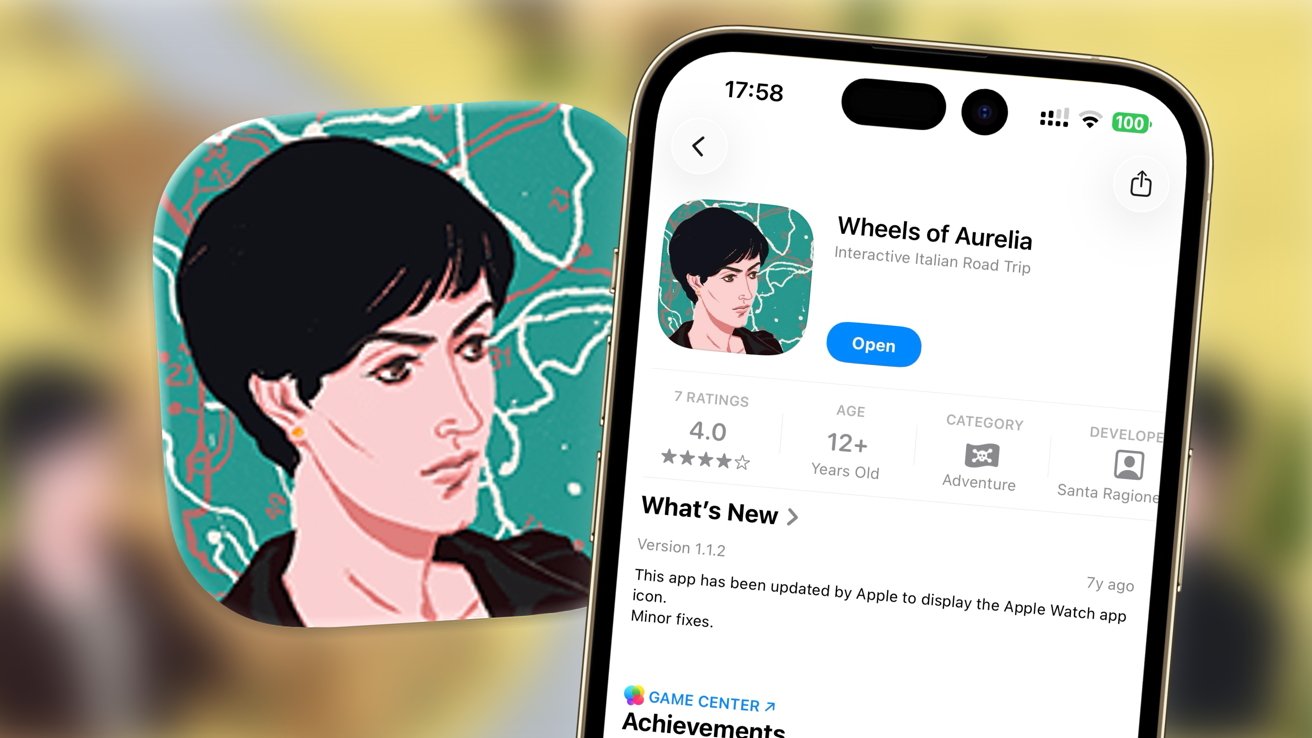
Wheels of Aurelia is facing removal from the App Store
Apple is repeatedly under fire for its App Store policies, but occasionally the complaints against it are questionable. One developer in Italy is declaring that Apple's warning it will delist a game from the App Store is an affront to culture itself.
Santa Ragione, a developer of Horses and Saturnalia, was told that its game Wheels of Aurelia will be removed from the App Store on July 25, 2025. Speaking to Game Developer, the studio took the news extremely poorly.
Apple warned the studio that the game would be delisted, but the studio insists that the reasoning for the removal was unclear. After appealing twice, studio co-founder and director Pietro Righi Riva was then called by a member of Apple's team, who told the developer to file another appeal.
Despite the repeated appeals, Apple is still seeking to remove the game from the App Store.A "lack" of justification
In its response to the warnings, Riva insists that Apple has been unclear as to why the app will be taken down. Or at least, not clear enough in a way that suits the company's needs.
He says Apple "has not provided clear justification for this removal." Granted, Apple does have a history of not being great with developer communications, but this time it seems more clear-cut.
This is especially true when that sentence continues to say that Apple cited "only" its policy for removing apps deemed "obsolete" or "outdated." This shouldn't apply to the game in question because it is still fully functional and compliant with current standards, Riva claims.
Riva then goes on to insist that Apple's move is anti-art and anti-culture.
"We firmly believe that removing fully functional artistic works simply due to infrequent updates undermines the value and sustainability of games as cultural and artistic products," he declares. Just like books and films, games represent creative works that "do not inherently require continual updates beyond maintaining basic functionality."
Updating Wheels of Aurelia would demand "very significant resources" to update the engine and other elements. All without making any "meaningful enhancements" to either the user experience or artistic value.
Forced updates represent a "substantial financial burden" that draws resources from other new projects, he adds.
Removing the apps also impacts the visibility of developers, Riva continues, affecting their recognition in a "very competitive industry." Apple's approach puts smaller developers at risk due to needing to continuously update their projects to meet changing demands.
Riva also jabs at Apple's apparent gatekeeping, saying its "dominant position" makes such practices "especially troubling." He then commends EU regulations like the Digital Markets Act designed to make a fairer market and prevent monopolistic behaviors.
"This obsoletion [sic] policy further reinforces a vision that does not recognize games as an art form," Riva concludes. "It is a view that, unfortunately, is becoming increasingly common across the industry."
Ahead of the scheduled pulling of the game, it has been made available as a free download in the App Store.Clearing the digital storefront
Apple has quite a few policies in place that impact how an app is added to the App Store, and how it must act while included within it. What is less talked about are policies that can see an app removed from the App Store.
There are the more obvious rules, such as content, which can get an app kicked out. But there are also rules that titles such as Wheels of Aurelia have fallen afoul of.
In this instance, the policies stem from "App Store Improvements" that Apple first introduced nine years ago, in September 2016. For apps that no longer functioned as intended or followed current review guidelines, Apple said they would evaluate the apps for issues, notify the developers of them, and potentially remove abandoned apps from the App Store.
This also included apps that "have not been supported with compatibility updates for a long time," in Apple's own words. "Compatibility updates" include device resolution adds, of which there have been three since the last time the game was updated.
By 2022, Apple clarified the criteria surrounding the process. This included justifications for maintaining security and compatibility with current hardware, but also for underperforming apps.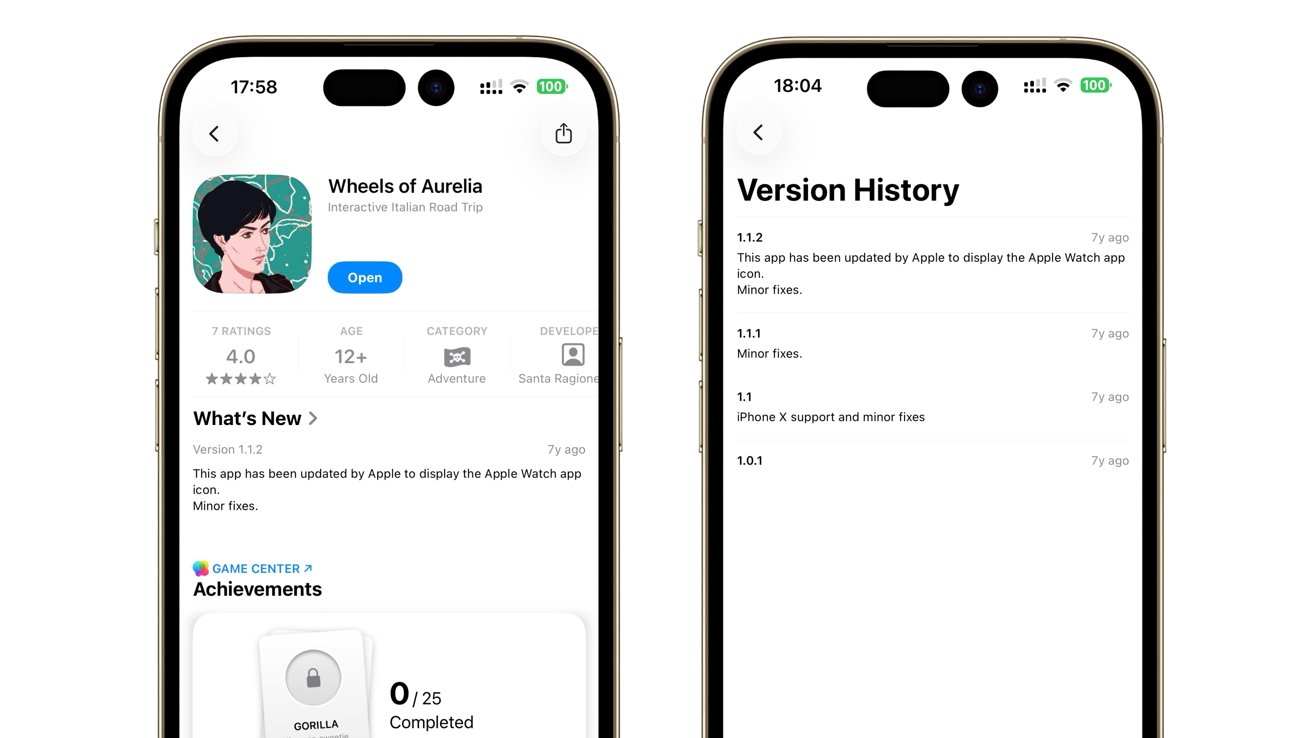
The last update in the App Store for Wheels of Aurelia was over seven years ago
Apple warned that developers of apps that had not been updated within the last three years and had failed to meet a "minimal download threshold" would receive an email warning about potential removal.
That threshold is further clarified to mean an app that had not been downloaded at all or "extremely few times" during a rolling 12-month period.
Developers were also given more time to update their apps, up to 90 days, to comply with the rules. The timeline continues to be adhered to by the current App Store Improvements policy.
When it comes to determining whether Wheels of Aurelia has fallen afoul of the rules, we can check at least one of the variables.
The game was released in 2016, but it's only had a few version updates since then. The last one was to version 1.1.2, on December 6, 2017.
By the time of the 2022 clarification of the policy applying to apps without updates for three years, the game hadn't been updated for over four years. At the time of publication, that's now stretched to seven years without an update.Timeliness is a virtue
Riva's arguments for updates have a point, and it can be summed up by the adage "If it ain't broke, don't fix it." Taking that approach can certainly apply in many areas, but app development isn't one of them.
Software security continues to be an important factor of modern-day computing, and making sure your software isn't contributing to the problem is just good policy.
Ensuring the apps continue to work properly on newer models of iPhone is also a very consumer-first approach. The iPhone 7 family of devices was released at that time, and there have been many releases -- with different screen resolutions -- since then.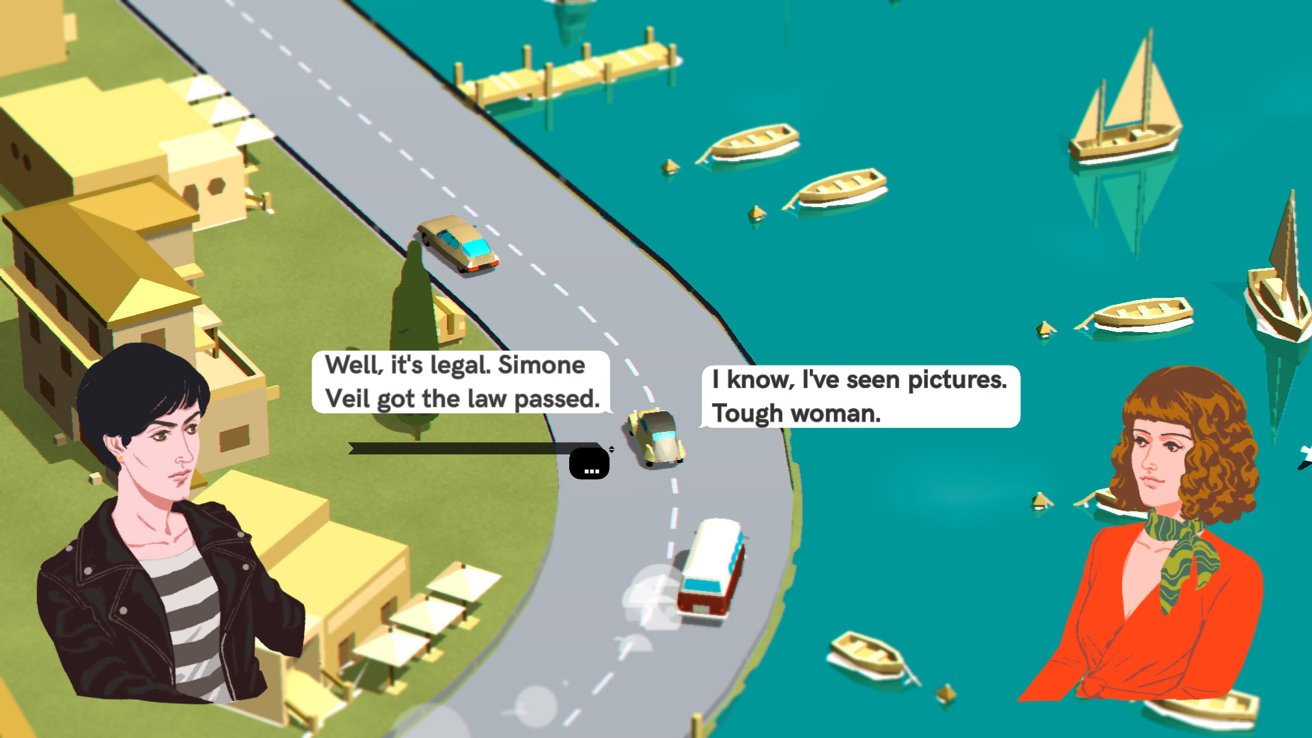
Wheels of Aurelia - Image Credit: Santa Ragione
Updates ideally could be made to take into account some of the changes, such as the aforementioned resolution or other internal specifications. Occasional compatibility updates would keep the app fresh in users eyes too, even if there were no material changes made to it.
There was enough justification in performing even one minor change to the app and updating it in the App Store, just to reset that three-year clock.
This would certainly pull a small amount of resources away from other projects as the developer says. But at least the game would be kept alive and in the store.
There is the counterargument that no one wants to resubmit a game update to the App Store Review process without justification, especially if it's in an already usable state.
Periodically doing so will at least ensure that the app will work for a few more years without any more tweaks needed.It's Apple's store
Apple's policies to remove titles from the App Store due to age and unpopularity are well within its rights as a retailer. It doesn't have to list your products, but it tends to do so since it will make some money off it in most cases.
At the same time, it has to ensure that its consumers are kept safe, but also offered products that are both current and popular.
A game that hasn't received updates in multiple years is not what you can consider "current," even if it functions fine.
Likewise, with Apple having to deal with hundreds and thousands of new apps and app updates every day, there is a lot of apps trying to become the most popular.
Apple's removal of old and unpopular apps also means there are fewer items on its infinite shelf space for consumers to choose from. It helps nudge consumers toward apps that others use and that they may also want to purchase, instead of old apps no-one else really uses anymore.
There is no value to Apple recommending an app that no one else has downloaded for months, since the market has already demonstrated the app no longer has a perceived value to the App Store. Removing it is a better option for Apple than keeping it around and wasting consumer attention, with a high likelihood of it not being bought anyway.
The argument that this is Apple denying the artistic value of a game is also not really applicable here. This is a policy based on schedule and hard data, not opinion.
While you may think an app or a game is considered art and should be included in the App Store, Apple doesn't have to abide by that. It's playing by literally different rules.One door closes, others stay open
Apple's pulling of an app from an App Store because no one's downloaded it in ages doesn't stop you from being able to acquire the game elsewhere.
It is still available on modern consoles, including the Nintendo Switch, Xbox, and PlayStation storefronts. It's also on the Epic Games Store and Steam for macOS, and even Google Play if you have an Android device.
While it won't necessarily be available from the App Store once the deadline passes, you can still get the game from many other venues. If you already have it for iOS, you'll also still be able to play it after its removal.
The best defense against the removal is actually something that Santa Ragione should've done. It had literally years to update the game, and it chose not to do it.
At this point, Apple has seemingly been very generous in allowing the game to exist in the App Store until now.
It has led the proverbial horse to the trough, filled it with clean and cool water, and even offered a sugar lump. Santa Ragione loudly complains that it is extremely thirsty, but won't take a sip.
We have reached out to Apple for comment. We are not expecting an answer.
Read on AppleInsider

-
AirPods could vibrate your head when you type on Apple Vision Pro in the future
A newly public Apple patent shows the company is working on ways to bring haptic feedback to the Apple Vision Pro. Unexpectedly, it may use AirPods to do it.
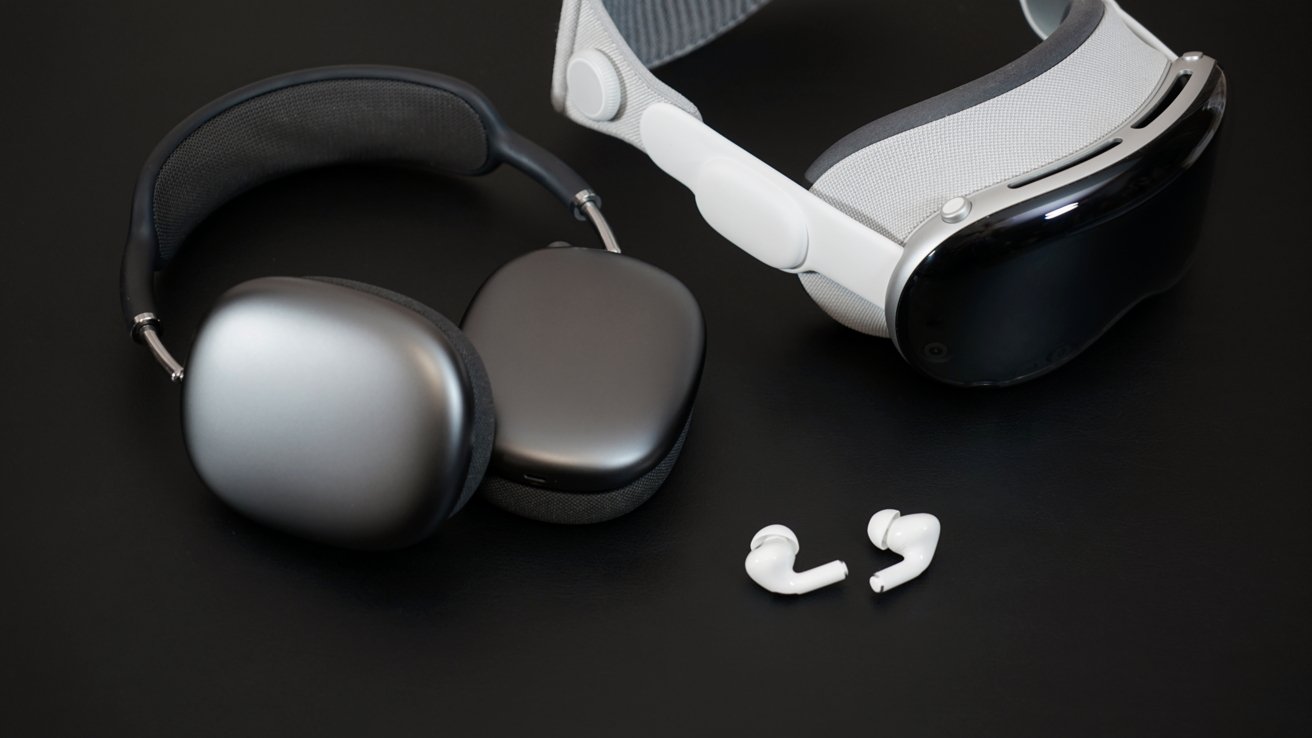
AirPods could bring haptic feedback to your Apple Vision Pro
The patent, dubbed "Input device for head-mountable devices," describes using unreleased earbuds to generate a haptic output. That output would be dictated by a signal from a head-mounted device, such as Apple's spatial computer.
While the patent doesn't mention AirPods by name, it's easy to see where Apple is going here.
"An earbud includes a housing, a haptic driver carried by the housing, a haptic surface defined by the housing, and an input surface defined by the housing," the typically dense patent reads.
"The haptic surface is coupled to the haptic driver, which is configured to generate a haptic output through the haptic surface in response to a haptic signal from a head-mountable device," the patent continues.
Essentially, Apple suggests that a device like the Apple Vision Pro could send a wireless signal to a pair of earbuds whenever haptic feedback is required. That signal would instruct the earbuds to vibrate, providing the kind of feedback currently unavailable.
Such a feature could be used in myriad ways and implemented in a variety of apps. Imagine playing a game and having your earbuds vibrate when you fire a weapon, for example.
Alternatively, the TV app on your iPhone could vibrate the earbuds when a truck rolls by or an explosion takes place. Apple recently previewed something similar with its F1: The Movie trailer that vibrated when viewed on an iPhone.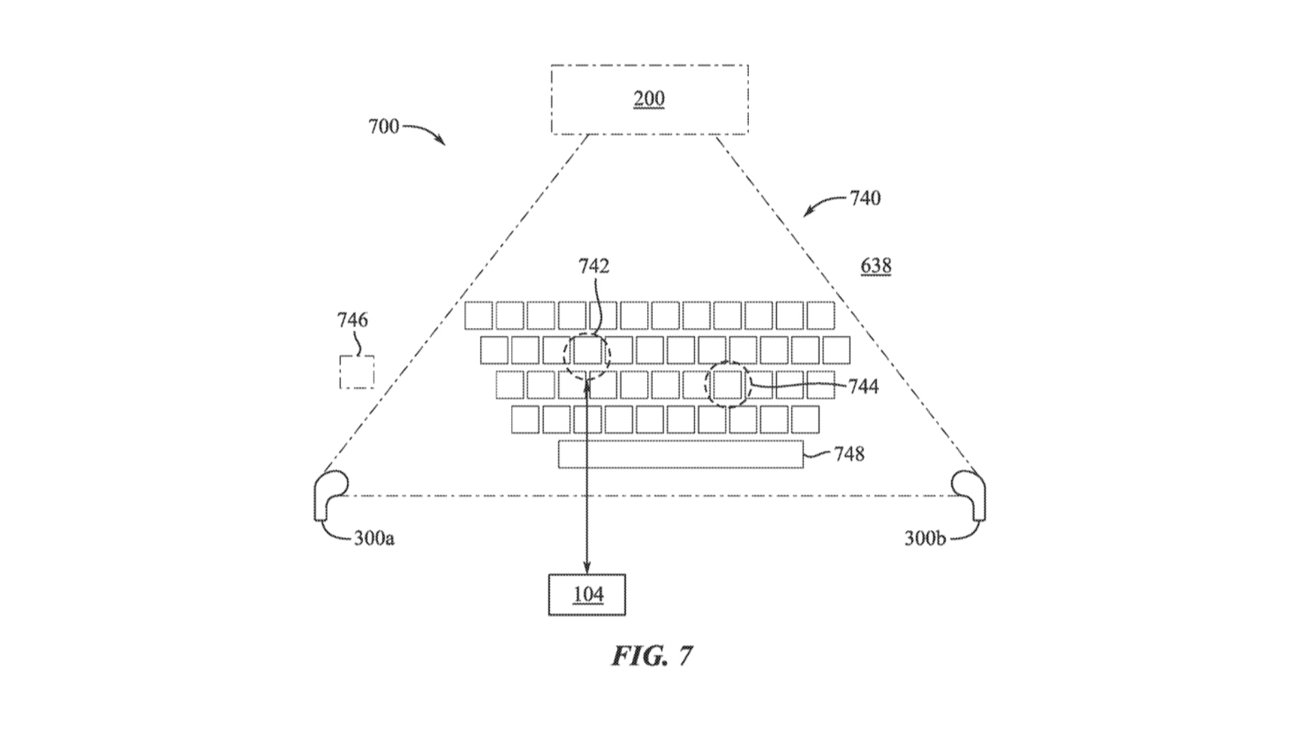
The patent shows earbuds being used to map out a virtual keyboard area
The patent also includes an image that depicts a user typing on a virtual keyboard. As the invisible keys are tapped, the earbuds could then vibrate to give the feeling of typing on a physical object.
Notably, the patent suggests that the earbuds themselves would be used to "define a touch space on a support surface at which touch inputs can be detectable."
A patent image shows a user placing the left earbud to the left of a virtual keyboard on a desk. The right earbud would be placed to the right of the keyboard, creating a virtual area between the two earbuds. Tapping in that area would then generate a haptic feedback.
The AirPods charging case would also be used to detect when a haptic feedback should be generated, the patent claims. The charging case could be placed on a surface and then detect when a user's fingers touch that surface.
However, as is always the case with patents, this should all be taken with a pinch of salt. While it does show that Apple has considered such a technology, it doesn't mean that it will ever see the light of day.
Apple, like other companies, patents almost everything that its engineers design. Those technologies could be useful in a future product, for example.
Patents also ensure that Apple can make a claim should another company try to use the same technology in its own products, too.
Read on AppleInsider
-
TSMC US chip production may soon only be three years behind Taiwan
TSMC is working to build two plants in Arizona faster, a move that could bring more Apple chip production to Arizona quicker -- but don't expect the newest chips.
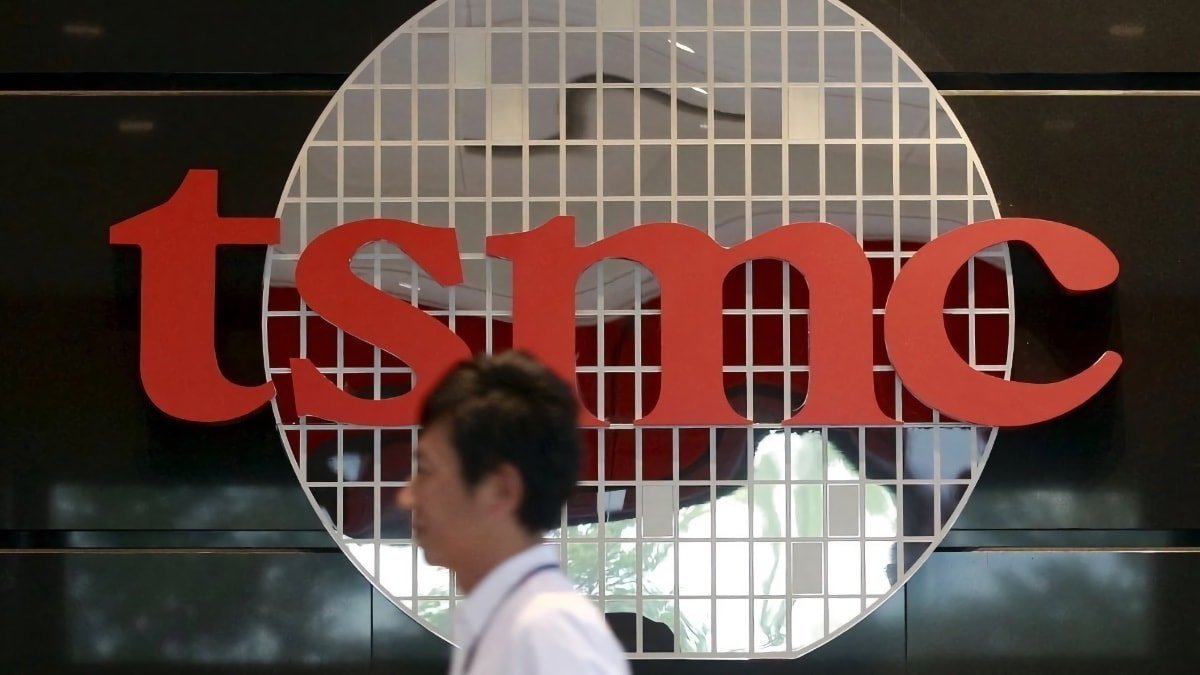
A worker passing a TSMC sign
The TSMC facility in Phoenix, known as Fab 21, is the chip foundry's first factory in Arizona dedicated to chip production. However, while two others are under construction, TSMC plans to have them up and running sooner than first thought.
According to Nikkei, TSMC intends to speed up construction of the two sites considerably. The factories will be accelerated "by several quarters," TSMC claims, with the intention of bringing them online faster.
TSMC says it is to meet the demand from U.S.-based customers for smartphone and AI computing chips.
"After completion, around 30% of our 2-nanometer and more advanced [chip] capacity will be located in Arizona," said TSMC chairman and CEO CC Wei on Thursday. It will create "an independent, leading-edge semiconductor manufacturing cluster in the U.S."Closer to Taiwan tech
The assertion by TSMC that it will be cutting "several quarters" off the construction time for its two factories is a big thing for U.S. chip production in general. Something that is severely lagging behind Taiwan.
In March, it was said that the second Arizona plant would be ready for 3-nanometer chip production by 2028, while the third plant would be used for 2-nanometer chips. That third plant, which broke ground in April 2025, was thought to be ready by 2030.
With 2-nanometer production already in progress in TSMC's Taiwan facilities, that effectively meant that TSMC's U.S. facilities were five years behind Taiwan.
By cutting down the construction schedule by a considerable amount, this could bring the overall lag for U.S. production down to as few as three years.Faster by investment
The acceleration of construction follows months after TSMC pledged a $100 billion investment in the United States. The investment, intended to take place over four years, was to be used to increase TSMC's manufacturing footprint in the country.
TSMC had already made an initial investment in Arizona to the tune of $12 billion in 2020. It has also received a $6.6 billion package from the Biden administration as part of the CHIPS act.
The latest high-value pledge will almost certainly be used in part to speed up the building of the facilities. Processes which, due to the size and complexity, take a long time to complete.The U.S. iPhone chip dream
The acceleration of construction at the facilities should be well received by the administration of President Donald Trump. He has repeatedly campaigned for more manufacturing to return to the United States, and has called out Apple to do the same.
There are roadblocks. Notably, a lack of U.S.-based resources and an educated local workforce needed for iPhone assembly to take place at all are the main hindrances.
It is highly plausible that the smartphone and AI chip demand could be from Apple, as the Cupertino company is one of TSMC's biggest chip clients. Such a move will make the construction of an iPhone entirely in the United States a little bit closer to reality.
Until that happens, Apple has no choice but to accept that its chips have to be built in TSMC's more up-to-date facilities in Taiwan. At least, for its more advanced chips.
The $100 billion won't necessarily allow the U.S. projects to catch up to Taiwan completely, but a few quarters closer is still a lot when it comes to manufacturing.
Read on AppleInsider

-
Kuo: Apple Watch shipments to decline in 2016 despite new models, lower prices
Well-connected analyst Ming-Chi Kuo believes Apple Watch sales will decline in 2016 despite the launch of a revamped Apple Watch Series 2 and price cuts for the refreshed first-gen model, now called Apple Watch Series 1.
In a note to investors obtained by AppleInsider, Kuo cuts 2016 Apple Watch shipping estimates 15-25 percent for Apple's latest smartwatch lineup, which includes both Apple Watch Series 1 and Series 2 devices.
Specifically, the analyst is revising shipping estimates from 10 to 10.5 million units down to 8.5 to 9 million units for the entire Apple Watch line. By comparison, Apple shipped 10.4 million Apple Watch units during eight months of availability in 2015, Kuo says.
According to Kuo, Apple Watch faces four structural challenges: a lack of killer applications; inadequate battery life; heavy reliance on iPhone; and likelihood that multi-touch will not be the best UI solution for wearable devices. The last concern is peculiar considering Apple Watch has never supported multi-touch input, though Kuo might be referring to potential future iterations of the product.
"This suggests that sales of the new Apple Watch models are indeed driven by hardcore Apple (US) fans, first-generation replacement demand and niche demand, rather than by the mass market," Kuo writes, adding that collaborations with big retail brands, namely Nike and Hermes, are unlikely to pan out.
Though Apple made internal improvements debuted with Series 2, including a "swim-proof" chassis and the addition of advanced components like a faster processor and GPS radio, the overall aesthetic remains unchanged from last year's model.
Apple is competing in a highly competitive wearables market, one dominated by less capable devices marketed by the likes of Fitbit. Whereas Apple Watch is a multifunction smartwatch, wearable fitness products do very few things, but they do them well.
Fitbit, in particular, is taking a page out of Apple's book with its wearable lineup. The fitness trackers are designed for, and marketed to, the mass market.
"We believe Fitbit's products can be likened to the iPod for their minimalist key functionality and outstanding design," Kuo says.
In this scenario, Apple Watch is an analog of the early smartphone before iPhone disrupted the scene. Kuo backs up his thesis with numbers from an in-house survey that shows Fitbit thriving in the second half of 2016 and through 2017, figures that suggest no negative impact from Apple Watch.
-
Bill Gates sides with FBI on Apple encryption fight, says scope is limited to one iPhone
Microsoft founder Bill Gates said he disagrees with Apple's decision to not provide the FBI with a software workaround that breaks iOS, and instead sides with a narrow reading of the government's request for assistance that supposedly precludes wider dissemination of the as-yet-uncreated expoit.

Source: Forbes
Gates weighed in on the hot button topic on Tuesday, telling the Financial Times that technology companies, including Apple, should comply with government requests for assistance pertaining to investigations into terrorist activity. Further, he disputes Apple's claims that the creation of a so-called backdoor would set precedent both for the Justice Department and international state players looking to get their hands on consumer data.
"This is a specific case where the government is asking for access to information. They are not asking for some general thing, they are asking for a particular case," Gates said. "It is no different than [the question of] should anybody ever have been able to tell the phone company to get information, should anybody be able to get at bank records. Let's say the bank had tied a ribbon round the disk drive and said 'don't make me cut this ribbon because you'll make me cut it many times'."
The U.S. Department of Justice, as well as FBI Director James Comey and the White House, argue much the same, noting the requested software workaround would be limited to an iPhone 5c used by San Bernardino shooter Syed Rizwan Farook. A federal magistrate judge last week ordered Apple comply with FBI requests to assist in the unlocking of Farook's iPhone, which is currently protected by a passcode.
For its part, Apple and CEO Tim Cook contend that the mere existence of a proof-of-concept exploit inherently weakens iOS safeguards, which is why the company is pushing back in court. Apple has been working with law enforcement officials on the San Bernardino case since January, and in doing so provided iCloud backups associated with Farook's device.
Despite a cavalcade of tech industry bigwigs coming out in support of Apple, a Pew Research Center poll on Monday showed a majority of respondents side with the government. It is unclear if the poll group understood the underlying digital security issues, as 51 percent of respondents said Apple should "unlock the iPhone."
The situation is made more confusing with the DOJ's side campaign for public opinion. It came out over the weekend that U.S. Attorney Eileen Decker and San Bernardino County District Attorney Mike Ramos asked a California lawyer Stephen Larson to file an amicus brief on behalf of the government. Larson's filing represents an unknown number of victims and families affected by the San Bernardino attack. -
President Obama urges prudence from both sides of encryption debate, warns against 'absolutist' pos
Speaking on the encryption debate at SXSW Interactive in Austin on Friday, President Barack Obama carefully navigated the waters between government overreach and civil liberties, saying that while both sides need to make concessions, encryption advocates should avoid taking an absolutist stance on the issue.

During a lengthy and wide-ranging discussion with Evan Smith, Editor in Chief of The Texas Tribune, Obama delivered what at first blush appears to be an even-keeled presentation of a topic that has, over the past month, morphed into a war of words between the Department of Justice and Apple.
"Technology is evolving so rapidly that new questions are being asked, and I am of the view that there are very real reasons why we want to make sure the government cannot just willy-nilly get into everybody's iPhones -- or smartphones -- that are full of very personal information," Obama said.
A federal magistrate judge in February ordered Apple to help the FBI break into a passcode-protected iPhone used by San Bernardino terror suspect Syed Rizwan Farook. The company is resisting, claiming, among other things, that the creation of a software workaround inherently weakens iOS encryption mechanisms and would thus put all iPhones at risk.
Unlike other politicians, Obama appears to have a good grasp of the issue's technical details, noting he thinks Apple's argument is likely true, albeit overstated. However, he did caution against an "absolutist" stance on the matter, saying un-hackable encryption is not an ideal solution. Law enforcement agencies exist to ensure public safety, and they need certain tools and levels of access to do so.
Obama suggested a solution that allows for constrained government access to private data. He likened the intrusion to TSA checks at the airport, drunk driving road blocks or tax enforcement; all accepted policies that, while potentially unpleasant, are recognized as important to the greater good.
"This notion that somehow our data is different and can be walled off from those other tradeoffs we make, I believe is incorrect," he said. "My conclusion so far is that you cannot take an absolutist view on this. So if your argument is 'strong encryption no matter what, and we can and should in fact create black boxes,' that I think does not strike the kind of balance we have lived with for 200, 300 years. And it's fetishizing our phone above every other value, and that can't be the right answer."
But the issue, of course, is in finding a system of checks and balances that appeases law enforcement requests while at the same time offering high levels of protection for consumers. Obama said one solution could be allowing very narrow access to personal data, which basically describes a privileged backdoor. Apple and fellow tech companies are vehemently against such concessions.
"If everybody goes to their respective corners and the tech community says, 'you know what, either we have strong, perfect encryption, or else it's big brother and [an] Orwellian world,' what you'll find is that after something really bad happens the politics of this will swing and it will become sloppy and rushed," Obama said. "And it will go through Congress in ways that have not been thought through. And then you really will have a danger to our civil liberties because the disengaged or taken a position that is not sustainable."


